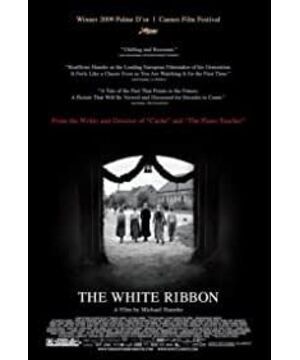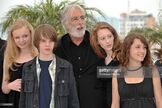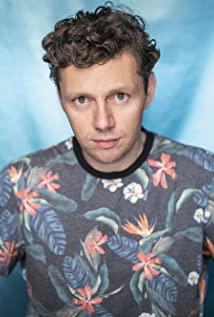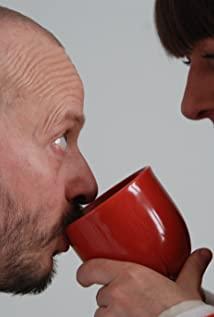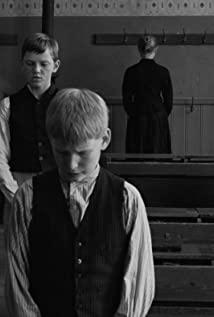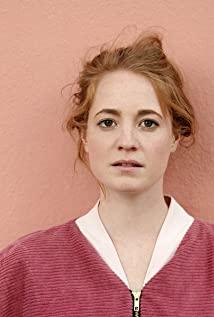If "Eavesdropping" is seen as the end of a totalitarian world, then "White Ribbon" seeks to find the beginning of that world, setting its sights on a German village on the eve of World War I, amid a series of suspicious and violent events. Find clues about the Third Reich.
This may not be a great movie, but a nation that reflects so thoroughly must be great.
1. Those evil children
By the end of the film, we still haven't got a definite answer, who is the murderer of those violent incidents, but we can be sure that those children made everything. Whenever a violent incident occurs, they gather together in tacit understanding, and their eyes show maturity and calmness beyond their age.
I have to admit, those glances gave me a little panic, like watching a horror movie.
Come to think of it, they plotted against the village doctor, they twice attacked the baron's child, they blinded the mentally handicapped illegitimate child of the doctor and the midwife. Faced with the questioning of the teacher who guessed the truth, they calmly and decently evaded.
This is indeed the child prepared for the Third Reich, with organization, discipline, proficiency in the use of violence, and a desire to reconstruct morality through violence.
Yes, all their violence has a stark revolt or punishment color against the callousness and hypocrisy of the adult world.
But what does their evil mean? Or where is the source of this evil? They are children after all.
We know that the world they see is nothing like what their father promised.
What's the point of trying to be an angel if the heaven promised by the father doesn't exist? To embellish that hellish real world? And more importantly, what is the impact of this discovery—a heaven that does not exist and a hell that exists—in itself?
2. Lies in the adult world
Shortly after the film begins, the white ribbon appears. Pastors punish their children - they go home too late, so they get ten slashes of cane and from then on tie white ribbons of purity around their arms to remind them of their moral flaws.
What the priest shows is the ideology of this society, and his weapon is not violence but morality, or hypocrisy. He didn't seem to love anything, maybe he fell in love with the hypocritical cold order he was trying to maintain. The only function of this order is to make people cherish hell as heaven.
The farmer's wife died in an accident, the cold world did not show the slightest kindness because of the farmer's resignation, and finally the farmer himself committed suicide because he was fired by the baron.
If the reality is like this, no matter how whitewashed it is, it is useless.
The doctor and the midwife committed adultery and gave birth to a mentally retarded son. And the doctor finally humiliated the midwife with cold words and was determined to stop the adultery, not because of repentance, but because he could vent on his growing daughter.
Consider the absurdity of a world where adults commit adultery and incest while a priest's son sleeps with his hands bound to avoid masturbation; on the other hand, a farmer's family is ruthlessly crushed by reality while a priest punishes his daughter for yelling in the classroom she.
What values does the world convey to children? Do we still wonder about the violence committed against doctors and illegitimate children? Still wondering about the two violent attacks on the Baron's son?
3. Where is God?
At the risk of breaking his neck, Martin walked on the railing of the bridge, in his words "give God a chance to kill me", and was satisfied with the outcome of the adventure, "God didn't do this, it shows that God is right. Satisfied with what I did" - he even laughed, one of the few smiles in the entire movie.
I'm not a Christian, but I know that Christ said, "Thou shalt not put your Lord to the test."
Faith is shaken, right?
Perhaps a more blunt scene occurred at the christening of Clara, the pastor's daughter, where the priest was both angry and helpless, and Clara's performance was meaningful. As the leader of the rebels, Clara has already seen the dirty secrets of the adult world, but the priest has to accept her, and even cover her by threatening teachers who discover the truth of violence. He clearly realized that Clara could never be brought into the order of the adult world. Perhaps the complicity that formed at that moment was such that Clara would continue to dominate the violence in the countryside, but never openly oppose the order of the adult world.
Yes, their logic is always like this, as long as it's not public, it doesn't exist.
So what about God?
Betrayed, traded.
In fact, there is no need for God in the adult world, as long as order is enough. God is nothing but an ideological word to demonstrate that order should and must be.
The real purpose of the white ribbon is not to lead to the purity of God, but to cultivate the humility that is due to the order of worship. They want every child to grow up to be like the farmer—every choice he makes—whether he suffers the loss of his wife or commits suicide, is the most standard and dignified abject under the order.
You cannot see God, but you can see the power of order.
4. Why is it a child, why is it a bird?
Hickey, the Baron's child, was twice the victim of violence.
Kari, the doctor's illegitimate son, mentally retarded, was beaten blind.
The bird, the priest's affectionate object, was pierced into a cross by Clara with scissors.
When we re-examine these violent incidents, we will find that, with the exception of doctors, the vast majority of victims are innocent and only have a symbolic meaning of sin. Maybe we are not animal protectionists and don't care about the bird, but the two suffering children are inescapable question marks, why them?
However, avoiding the bird made it difficult to answer the question. To the Claras, Hickey, Cary, and Bird are one and the same symbol.
When children discover the lies of the adult world, the moral purity implied by the white ribbon loses its meaning, and the order represented by the priest is nothing but a means to cover up the truth. So violence has a legitimate basis, order is the enemy, hypocrisy is the enemy, and violence is the most direct weapon.
If it is seen that God is but an illusion, then the destruction of order is the end in itself, and violence is not just a weapon, but a totem that can replace God.
Violence is the negative of order, and the bird with the scissors pierced into a cross is the negative of God.
What about the white ribbon? Is it a negative of the Nazi badge "swastika"?
In such a confrontation between black and white, the goodness of human nature was destroyed together before it could be severed from hypocrisy.
Even, we have not yet had time to demonstrate the tolerance of human nature to children.
Why a child?
After the Nanping massacre, this is a heart-wrenching question mark. I can only try to answer, because the Claras are not yet grown up, and in the future, when they are powerful enough, they will destroy everything - also children, or birds.
They don't forgive anyone.
And that's how history is written.
5. Superfluous words
There is no doubt that this is an ambitious film, which abandons the garishness of technique, completely black and white tones, no soundtrack, and tortures the evil deep in human nature in monotony and silence. This is another reflection that moved me after The Reader.
At the end of the film, World War I broke out, and the violence was overshadowed by the war. We know history. After the defeat, Germany blamed the defeat on the "enemy behind", and the Nazis came on stage.
The teacher who discovered the truth remained silent. It's a common metaphor for the silent intellectual, and Güntegrass has more acerbic reflections in "The Tin Drum" -- refusing to grow up Oscar to domesticate his cry into the flattering art of lettering on glass -- - This always reminds me of Chen Kaige's fall from "Farewell My Concubine" to "Wuji".
Yes, history prepares for a long time before every major event. It may take a century of reflection before we realize that every child's growth is part of historical preparation.
It's just that we don't know what's going to happen.
If the white ribbon of punishment will only ever be tied on the arms of the humble "Chinese women", children will eventually see through the secrets of our world and give back the qualities we have given them with reality.
They are future masters, ours and their future masters.
I would like to commemorate those innocent children in Nanping with this article.
View more about The White Ribbon reviews


